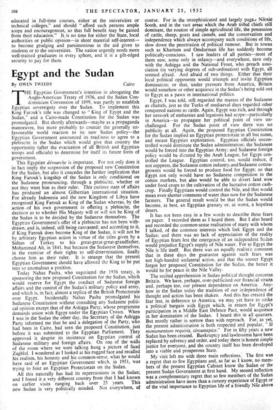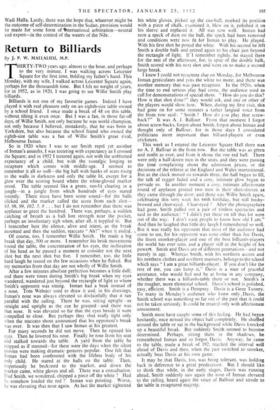Egypt and the Sudan
THE Egyptian Government's intention in abrogating the Anglo-American Treaty of 1936, and the Sudan Con- dominium Convention of 1899, was partly to establish Egyptian sovereignty over the Sudan. To implement this King Farouk's title was changed to " King of Egypt and the Sudan," and a Cairo-made Constitution for the Sudan was promulgated. But shortly afterwards—maybe as a propaganda manoeuvre, but more probably to counter the generally un- favourable world reaction to its new Sudan policy—the Egyptian Government announced its readiness to agree to a plebiscite in the Sudan which would give that country the opportunity (after the evacuation of all British and Egyptian troops and officials) to determine for itself its future form of government.
This Egyptian demarche is important. For not only does it in fact imply the suspension of the proposed new Constitution for the Sudan, but also it concedes the further implication that King Farouk's kingship of the Sudan is only conditional on the Sudanese pronouncing, through a plebiscite, whether or not they want him as their ruler. This curious state of affairs has produced an almost Gilbertian international situation. For already Indonesia and the new Kingdom of Libya have recognised King Farouk as King of the Sudan whereas, by the action . of his own government in offering a plebiscite, the decision as to whether His Majesty will or will not be King of the Sudan is to be decided by the Sudanese themselves. The Egyptian Government's offer of a plebiscite has not been with- drawn, and is, indeed, still being canvassed; and according to it, if King Farouk does become King of the Sudan, it will not be by arbitrary Egyptian action in virtue of the titles given by a Sultan of Turkey to his great-great-great-grandfather, Mohammed Ali, in 1841, but because the Sudanese themselves, in the exercise of their rights to self-determination, finally choose him as their ruler. It is strange that the present Egyptian Government should have allowed the King to be put into so anomalous a position.
Today Nahas Pasha, who negotiated the 1936 treaty, is sponsoring the new proposed Constitution for the Sudan, which would reserve for Egypt the conduct of Sudanese foreign affairs and the control of the Sudan's military policy and army, and which is, in fact, almost a replica of the British Protectorate over Egypt. Incidentally Nahas Pasha promulgated his Sudanese Constitution without consulting any Sudanese politi- cal opinion except that of the Ashigga Party, whose programme demands union with Egypt under the Egyptian Crown. When I was in the Sudan the other day, the Secretary of the Ashigga Party informed me that he and a delegation of the Party, who had been in Cairo, had seen the proposed Constitution, just before it was submitted to the Egyptian Parliament. They approved it despite its insistence on Egyptian control of Sudanese military and foreign affairs. On one of the walls of the room where we were talking hung a picture of Saad Zaghlul. I wondered as I looked at his rugged-face and recalled his realism, his honesty and his common-sense. what he would have said of an Egyptian Government which, in 1951, was trying to foist an Egyptian Protectorate on the Sudan.
All this naturally has had its repercussions in the Sudan; and I found it a very different country from that I had known on earlier visits ranging back over 25 years. This new Sudan is very politically minded. Not everywhere, of course. For in the unsophisticated and largely paga.i Nilotic South, and in the vast areas which the Arab tribal chiefs still dominate, the routine of simple agricultural life, the possession of cattle, sheep, goats and camels, and the conservatism and independence which always accompany such conditions of life, slow down the penetration of political rumour. But in towns such as Khartum and Omdurman life has suddenly become politically-conscious. I saw leaders of all parties—most of them new, some only in infancy—and everywhere, save only with the Ashigga and the National Front, who preach asso- ciation (in varying degrees of sub-ordination) with Egypt, all seemed afraid. And afraid of two things. Either that their local political opponents would triumph and invite Egyptian domination; or that, Under -pressure from America, Britain would somehow or other acquiesce in the Sudan's being sold out .to Egypt as a pawn in international politics.
Egypt, I was told, still regarded the masses of the Sudanese as chattels, just as the Turks of mediaeval days regarded other conquered nations as cattle. Again, Egypt was rich, and through her network of embassiei and legations had scope—particularly in America—to propagate her political point of view un- challenged. For the Sudan point of view there was no publicity at all. Again, the proposed Egyptian Constitution for the Sudan implied an Egyptian protectorate in all but name, and meant Egyptian exploitation. Egyptian officials uncon- trolled would dominate the Sudan administration; the Sudanese would be forced into the Egyptian Army; and Sudanese foreign policy would be dictated by the Arab League, for Egypt con- trolled the League. Egyptian control, too, would reduce, if not suppress, the Sudanese cotton industry, and Sudanese cotton- growers would be forced to produce food for Egypt; so that Egypt not only would have no Sudanese competition in the cotton markets, but also would be able to divert land now under food crops to the cultivation of the lucrative cotton cash- crop. Finally Egyptians would control the Nile, and that would.
mean even shorter commons of water than now for the Sudanese farmers. The general result would be that the Sudan would become, at best, an Egyptian granary or, at worst, a hopeless desert.
It has not been easy in a few words to describe these fears on paper. I recorded them as I heard them. But I also heard and recorded the common-sense realisation of many with whom I talked, of the common interests which link Egypt and the Sudan; and there was no lack of appreciation of the reality of Egyptian fears lest the emergence of an independent Sudan would prejudice Egypt's supply of Nile water. For to Egypt the Nile is life itself. But there was an equally realistic comment that in these days the guarantee against such fears was not high-handed unilateral action, and that the sooner Egypt forgot her proposed Constitution for the Sudan, the better it would be for peace in the Nile Valley. The second apprehension in Sudan political thought concerns Britain. We have, perhaps, over-publicised our financial straits and, perhaps too, our present dependence on America.. Any- how in the Sudan today the tradition of our independence of thought and action has been shaken. And this has created the fear lest, in deference to America, we may yet have to strike a political bargain with Egypt which, in return for Egypt's participation in a Middle East Defence Pact, would acquiesce in her domination of the Sudan. I heard this in all quarters.
But mostly rather in sorrow than with reproach. For, as yet, the present administration is both respected and popular, Si" monitmentum requiris, circumspice." For in fifty years a new Sudan has been created. Bankruptcy and lawlessness hiave been replaced by solvency and order, and today there is honest simple justice for everyone, and the country itself has been developed into a viable and prosperous State. My visit left me with three main reflections. The first was a regret that so few Egyptians and, as far as I know, no mem- bers of the present Egyptian Cabinet know the Sudan or the present Sudan Government at first hand. My second reflection was a complementary regret that so few members of the Sudan administration have more than a cursory experience of Egypt or of the vital importance to Egyptian life of a friendly Nile above Wadi Haifa. Lastly, there was the hope that, whatever might be the outcome of self-determination in the Sudan, provision would be made for some form of ihternational arbitration—neutral and expert—in the control of the waters of the Nile. ,



































 Previous page
Previous page